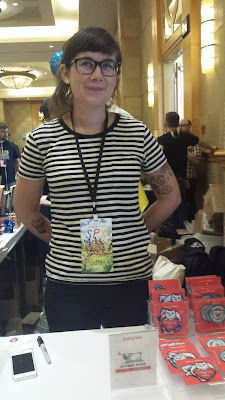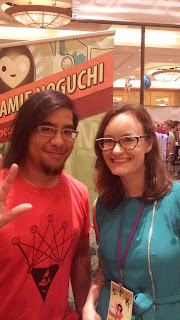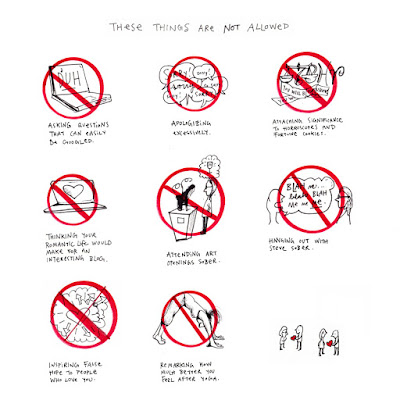
by Mike Rhode
Jasmine Pinales exhibited at the DC Zinefest and agreed to answer our usual questions afterward. She will be at SPX this fall if you'd like to meet her, and her comics are for sale now on her website. (All images are taken from her website).
What type of comic work or cartooning do you do?
I write and draw fiction and autobio comics.
How do you do it? Traditional pen and ink, computer or a combination?
My
work is all traditional. I pencil, ink and letter on paper. I've used
ink, markers and watercolor for my final pages depending on what best
fits a project. I have produced some digital art but it never feels as
strong as my traditional art, I don't think it's the best representation
of my art. I lay out my comics on computer and do corrections and clean
up.
When (within a decade is fine) and where were you born?
1988.
Why are you in Washington now? What neighborhood or area do you live in?
I
live outside of DC in Fairfax County. We moved here when I was 3 and
I've been here most of my life. I went to Norfolk for college then
returned.
What is your training and/or education in cartooning?
Most
of my comics work is self taught. I spent my childhood reading the
WashPo comics section, collected
Garfield, Calvin & Hobbes and other
strips. In late elementary school I got interested in anime and manga
and started copying that while still be interested in American cartoons
and the eventual rise of webcomics on the internet. I've never taken a
comics class, I've learned by example and reading all of the backmatter
in comics about how pages are made. I've got Eisner's books on comics,
and McCloud's which gave me more concrete ideas on how to make better
comics. I have a BFA in Studio Art where I focused on comics for my
Senior Show, so I have art training.
Who are your influences?
Everything.
I really got into Will Eisner's work between
The Spirit and his more
personal projects after he was done with that. Piet Mondrian is one of
my favorite painters, I love Dali and Caravaggio. Yuko Ota and Meredith
Gran have some of the best comic timing and gorgeously clean art. Takako
Shimura has comics fill of emotional characters and art that has a nice
weight to it. So many cartoons, I loved
The Weekenders and
Recess as a
kid. I've pulled visual cues I like from Jen Wang, I really like the was
she draws eyes. Craig Thompson's work is gorgeous and made me want to
try harder with brushes/brush pens. Internet discussions have made me
more confident and inspired to try a broader variety in body types and
more diversity, even though plenty of my early characters had variety.
If you could, what in your career would you do-over or change?

All
of my past experiences have brought me to where I am now and things
would be different if I changed anything. That said, it'd be interesting
to see how things could be different if I had gone into college
focusing on comics and art and not transferring to comics after a few
years in science.
What work are you best-known for?
I don't think I'm known for anything at this moment.
What work are you most proud of?
"How
to Make Friends and Captivate People", it's my longest comic to date at
28 pages or so, the printed book has 40 because of an extra story. It
was a struggle to produce as I had never tried such a long narrative and
I misjudged how long it would take.
What would you like to do or work on in the future?
I'd
like to continue working on my various stories and characters. I have a
female knight and prince story; a group of theater nerd kids; a
depressed robot and a myriad of others that I'm sketching out and
thinking over slowly. I have a lot of ideas and just need the money and
time to focus on them.
What do you do when you're in a rut or have writer's block?
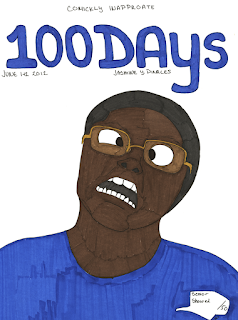
I'll
step away from a project and create differently. Changing media or
tools helps to reinvigorate me to focus on the main projects I'm working
toward. This year I got into Hamilton and drew a mess of art, sketches
and comics and in the past few weeks I've been listening to the audiobook
of
Jurassic Park and have had a wealth of ideas for mini comics about
the first book that have relatively little to do with the movie.
Sometimes indulging and receiving media is necessary to get a new spark,
you'll see the right turn of phrase and everything starts turning again
and you can keep creating. Another thing I've done, in 2013 after
college I stopped drawing just to take a break and I felt awful not
drawing anything after a few months so I forced myself to do a little
sketch before bed.
Those sketches turned into a sketchbook I
have a shows for sale as I worked through being burnt out and getting
back into the groove of production. In 2014 I did a daily sketchbook
where I tried different ideas in the small spaces I had. These were for
me but sharing them was a great experience too as I became more
comfortable with what I could do in the space provided and looked up new
topics.
What do you think will be the future of your field?
More
independent creators and creator owned work becoming popular and bigger
powerhouses in comics shops. Image does an amazing job putting creators
first and Fantom Comics in Dupont Circle works so hard to promote creator own
material even as they stock DC and Marvel. They're still big in
supporting local DMV creators.
What local cons do you attend? The Small Press Expo, Intervention, or others? Any comments about attending them?
I've
attended
SPX since 2012 and this is my first year tabling it, I'm
excited. It's a lovely show to attend, a large crowd but there's so much
positivity and love for comics in everyone attending and tabling it's
great. I'll have at least one new book there that weekend that I'm working on. I'm at L7.
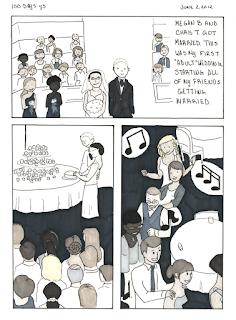
BMore Into Comics in Baltimore is a fun little day show. It's
tiny -- in a bar -- but as an attendee you would have plenty of time to
talk to the local artists who are tabling. An upside to small shows
over big shows and some great local creators go there.
The DC
Zinefest - I've shown there since 2015, the audience is very
enthusiastic. It's great seeing how many female creators there are.
The
Richmond Zinefest, I've tabled there two times now, and it's been in
different venues both years, but has been going on for a while in its
previous venue. The way it was set up in the library felt confusing as a
tabler, maybe it was better for someone who knows that library better,
but I heard from many people as they stumbled to the room I was in they
were surprised there was another room.
Locus Moon in Philly, I
showed there in 2015, it was a ton of fun. Great creators and audience.
Everyone there was super enthusiastic. I've heard they're focusing more
on publishing and I'd like to go to the show again, not sure if it's
happening anymore.
Comics Arts Brooklyn - a small show in a church
in Brooklyn, NY. Like smaller shows you get a great change to meet and
talk to a creator for a while. Attendance has been enthusiastic and it's
at a pretty good time of year in November, chilly but not too cold.
What's your favorite thing about DC?
The variety of people and things to do.
Least favorite?
Metro.
Also driving around here is a hassle, not always a direct way
someplace. I can drive from where I am to Maryland in 30 minutes or to
the middle of the city in 45.
What monument or museum do like to take visitors to?
I don't have many visitors, I'd want to show them the [National Gallery of Art's] East and West Galleries though; I'm a big fan of art history.
How about a favorite local restaurant?
Daikaya in Chinatown. Both the upstairs Izakaya and the downstairs ramen bar.
Do you have a website or blog?
jasmine-pinales.com also
meisterjdraws.tumblr.com
